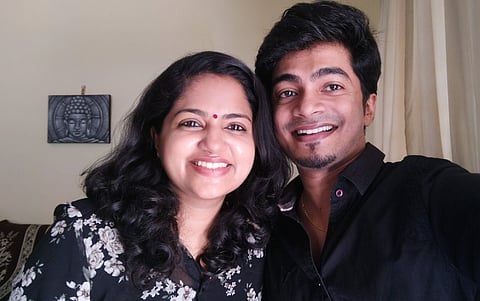This sibling duo's start-up uses AI-enabled technology to assess student abilities to help better evaluation
Who are you?
No, I’m not here to fuel your existential dread. But in case you’re still in school and dreading to answer the question, Edu-Wudi might be just the platform for you. In 2014, Arjun Hari struggled to answer this question in his first year of MBA at IIM Kozhikode. The engineering graduate from NIT Calicut could barely remember why he chose the profession in the first place. So he decided to venture further and see if that was a common sentiment.
In the same year, he decided to set up WUDI, an AI-driven data analytics platform. Arjun says, “We are not your basic EdTech start-up. We’re not busy creating content or giving you instructions on what to learn. We focus on whether there is some mechanism behind finding out who we really are. For example, let’s say I’m 21, just got out of engineering college and looking for a job. The problem is that I still wouldn’t know what I’m good at. My engineering degree doesn't tell me what I'm good at. After 18 odd years of education, we have no idea about ourselves or what we have to offer. Is there a solution?”
This is what Edu-WUDI, the education arm of the start-up aimed to answer. The platform is designed to understand a student from a subjective context and tries to discover their skill, talents and abilities using machine-supported Artificial Intelligence. The software is used by teachers, coaches and trainers in the various institutions that WUDI has partnered with to enter subjective questions based on the interests, co-curricular inputs and other skills of each student, so their abilities can be evaluated independent from simply their exam answers.
LAB STORY: WUDI was integrated into IIMK Live
In 2015, WUDI was integrated into IIMK Live, the institute’s entrepreneurship incubator. Arjun approached his sister, Nikita Hari, a Cambridge Doctoral Scholar and a Post Doctoral Fellow from Oxford, who was an expert in the fields of semi conductors and artificial intelligence who was involved in teaching since her college days. She joined in on the project and brought in a vast network of academic connections that allowed them to introduce the programme to over 15 countries.
“Why I believe this could make a real impact is that there’s no intervention by an individual at any point, so it’s a continuous process that has no human judgement involved,” explains 30-year-old Arjun. “Almost 95 per cent of engineers are people who are unemployable. And the same was true for many other degrees. But you can’t blame the degree. Something is clearly wrong with the individual or the ed system. So we looked at the individual. We usually know what we want by 11th or 12th standard. We make a clear diversion there when we choose the subjects we want. Then your options get increasingly narrower. At that juncture, many of us just choose the most convenient option or the one that others tell you. By taking that human influence out, we are allowing students to make their own informed choices based on their skills and qualities alone. “
When they approached schools to do the research, the team found that teachers were overloaded with information and work, so they had a daunting task in front of them as to how they could borrow the teachers’ valuable insight of their students without sacrificing their time. They optimised their platform to ask yes or no questions to the subjective topics that they needed answers for. The AI-enabled machine automatically generates questions based on context. For every class and every subject, it only required a teacher to make the entry once a week, for each student, for them to get at least 40-50 data points from each teacher regarding their students.
Following this, Edu-WUDI’s learning model tries to understand how accurate the data is through an internal correction process to ensure credibility. As biases could present themselves even within the education community, it determines how much weight should be attached to each facilitator’s entry. In the past five years since its inception, the machine has learnt from the various inputs of data that it receives to make calculated decisions. With over 2000 users engaged to it currently, the idea is to continue adding data to perfect it further.
However, conventional schools were not too quick to jump on the bandwagon. So WUDI began to approach unconventional schools where the main idea was to involve the individual. “Lots of schools are coming up where they don't really have a curriculum, it is more of a physical setup with personalised learning. Maybe they have just 20 students but they will all be learning differently. Every day is a new day. We work with organisaions who teach art, quizzing, karate, etc.”
This year, they became one among the 4 start-ups that were chosen from Indian for Startup Istanbul, a platform that displays unique ideas from around the world. From Future Schools in Kochi and a number of educational NGOs, the company is now trying to expand to US and European markets.


